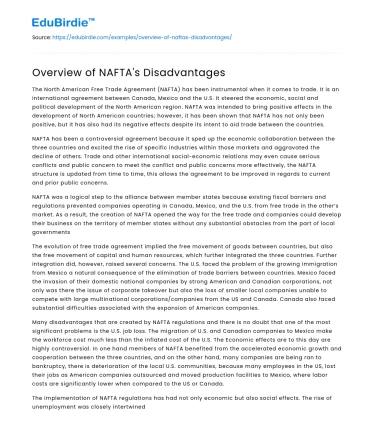The North American Free Trade Agreement (NAFTA) has been instrumental when it comes to trade. It is an international agreement between Canada, Mexico and the U.S. It steered the economic, social and political development of the North American region. NAFTA was intended to bring positive effects in the development of North American countries; however, it has been shown that NAFTA has not only been positive, but it has also had its negative effects despite its intent to aid trade between the countries.
NAFTA has been a controversial agreement because it sped up the economic collaboration between the three countries and excited the rise of specific industries within those markets and aggravated the decline of others. Trade and other international social-economic relations may even cause serious conflicts and public concern to meet the conflict and public concerns more effectively, the NAFTA structure is updated from time to time, this allows the agreement to be improved in regards to current and prior public concerns.
Save your time!
We can take care of your essay
- Proper editing and formatting
- Free revision, title page, and bibliography
- Flexible prices and money-back guarantee
NAFTA was a logical step to the alliance between member states because existing fiscal barriers and regulations prevented companies operating in Canada, Mexico, and the U.S. from free trade in the other’s market. As a result, the creation of NAFTA opened the way for the free trade and companies could develop their business on the territory of member states without any substantial obstacles from the part of local governments
The evolution of free trade agreement implied the free movement of goods between countries, but also the free movement of capital and human resources, which further integrated the three countries. Further integration did, however, raised several concerns. The U.S. faced the problem of the growing immigration from Mexico a natural consequence of the elimination of trade barriers between countries. Mexico faced the invasion of their domestic national companies by strong American and Canadian corporations, not only was there the issue of corporate takeover but also the loss of smaller local companies unable to compete with large multinational corporations/companies from the US and Canada. Canada also faced substantial difficulties associated with the expansion of American companies.
Many disadvantages that are created by NAFTA regulations and there is no doubt that one of the most significant problems is the U.S. job loss. The migration of U.S. and Canadian companies to Mexico make the workforce cost much less than the inflated cost of the U.S. The Economic effects are to this day are highly controversial. In one hand members of NAFTA benefited from the accelerated economic growth and cooperation between the three countries, and on the other hand, many companies are being ran to bankruptcy, there is deterioration of the local U.S. communities, because many employees in the US, lost their jobs as American companies outsourced and moved production facilities to Mexico, where labor costs are significantly lower when compared to the US or Canada.
The implementation of NAFTA regulations has had not only economic but also social effects. The rise of unemployment was closely intertwined with NAFTA. Outsourcing is the principal contributor to the rise of unemployment in the U.S. The growing unemployment in the U.S. was not the only effect of the implementation of NAFTA. Mexico and partially Canada faced the problem of their small and medium companies unable to compete with the larger multinational corporations based in the U.S. The large multinational corporations essentially swept away many of the medium and small companies. As a result, many businesses in Mexico and Canada have run bankrupt which has increased the social-economic tensions.
The influx of immigration from Mexico to the U.S. and partially to Canada was another effect of NAFTA. The agreement encouraged the free movement of goods, capital, and human resources and as a result, many Mexicans moved north to the U.S. and Canada in search of a better life. Not only was this a blow to the U.S. Labor force, but it also caused increased social tensions and competition in the local labor job markets. With the growing immigration, many Americans insisted on the change of immigration laws to stop the flow of immigrants from Mexico.
The controversy of NAFTA is obvious. As companies have reached their limits within national frontiers, they needed to enter international markets and NAFTA was their flagship. It has been the perfect tool for the fast economic market expansion. Large multinational corporations have penetrated new markets and have/ are establishing their control in taking the leading position of the ‘NAFTA economy’. It is understood that there is a need for the introduction of restrictions in terms of NAFTA. It is essential for the prevention of the further growth of the control of large corporations over national economies.
NAFTA needs changes to prevent its negative socioeconomic effects with Canada, Mexico, and the U.S. Policy makers should make NAFTA socially responsible and protect the interests of employees but not the interests of large corporations as NAFTA does at the moment.






 Stuck on your essay?
Stuck on your essay?

